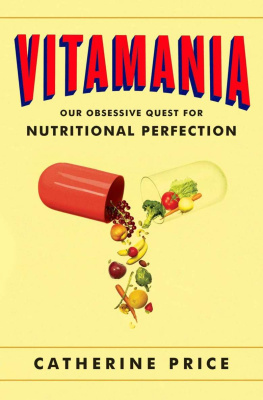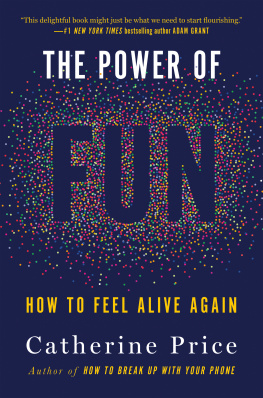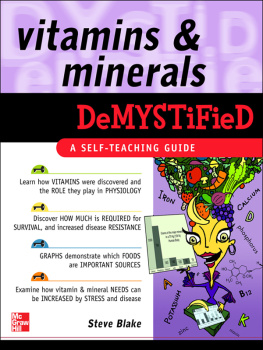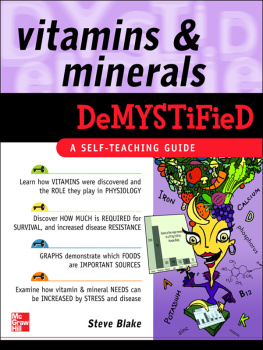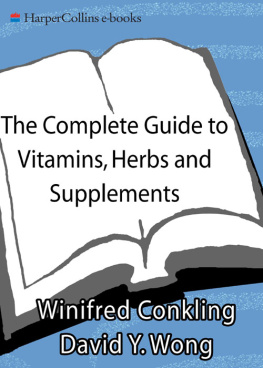Penguin supports copyright. Copyright fuels creativity, encourages diverse voices, promotes free speech, and creates a vibrant culture. Thank you for buying an authorized edition of this book and for complying with copyright laws by not reproducing, scanning, or distributing any part of it in any form without permission. You are supporting writers and allowing Penguin to continue to publish books for every reader.
Vitamania : our obsessive quest for nutritional perfection / Catherine Price.
Includes bibliographical references and index.
1. Vitamins in human nutritionSocial aspectsUnited States. 2. Dietary supplementsSocial aspectsUnited States. 3. NutritionUnited StatesPsychological aspects. 4. FoodUnited StatesPsychological aspects. 5. VitaminsHistory. I. Title.
This publication contains the opinions and ideas of its author and is designed to provide useful advice in regard to the subject matter covered. The author and publisher are not engaged in rendering medical or other professional services in this publication. This publication is not intended to provide a basis for action in particular circumstances without consideration by a competent health professional. The author and publisher expressly disclaim any responsibility for any liability, loss, or risk, personal or otherwise, which is incurred as a consequence, directly or indirectly, of the use and application of any of the contents of this book.
The more we know, the more we dont know.
INTRODUCTION
I f theres one thing about nutrition we think we know for sure, its that vitamins are good for us. In reality, however, most of us know nearly nothing about vitamins. And our faith in themcombined with the philosophy toward nutrition that they have enabledis doing us harm.
Discovered barely a century ago, vitamins were a revolutionary breakthrough in nutritional science, providing cures and preventions for some of the worlds most terrifying diseases. But it wasnt long before vitamins spread from the labs of scientists to the offices of food marketers, and began to take on a life of their own. By the end of World War II, vitamins were available in forms never before seen in naturevitamin-fortified peanut butter, vitamin gum, even vitamin doughnutsand far from expressing skepticism over these products, the public clamored for more. The era of vitamania, as one 1940s journalist called it, had begun.
Today, were still vitamaniacs, such believers in vitamins inherent goodness that we dont realize just how much scientists still dont understand about how vitamins work in our bodies, or how much of each we require. Were not aware that vitamins (and our enthusiasm for them) are what opened the door for the rotating cast of supposed wonder nutrients that intrigue and confuse us today, whether they be probiotics or antioxidants or omega-3s. We dont notice the ways that food marketers and dietary supplement makers use synthetic vitamins to add a veneer of health to otherwise unhealthy products; nor do we acknowledge the extent to which we use vitamins and these other vitamin-inspired nutrients to give ourselves a free pass to overeat foods of all kinds. And we certainly dont recognize the irony of our vitamin obsession: that by encouraging the idea that isolated dietary chemicals hold the keys to good health, our vitamania is making us less healthy.
One assumption about vitamins is definitely true: we do indeed require them. The thirteen dietary chemicals that we call vitamins affect each one of us every minute of every day, helping us to think and speak and move our muscles, pull energy from what we eat, even see the words on this page. Deficiencies in these chemical compounds have killed and continue to kill millions of people around the world, and when administered soon enough, vitamins can be astoundingly powerful, even miraculousgive vitamin A to a child suffering from the vitamin A deficiency condition of night blindness, and she can regain full sight within days. Our need for them is ultimately no more avoidable than our need for air; while normally invisible, vitamins implications are profound.
But the very power of vitamins makes them a double-edged sword. Their ability to save lives has promulgated the idea that they can perform miracles in all of us, regardless of whether were actually deficient; this, in turn, has led to beliefs in vitamins that are based more on faith than fact. When we seek out vitamins today, its not because were worried about night blindness, or pellagra, or beriberi, or any of the other conditions that vitamins can actually prevent and curetrue vitamin deficiency diseases have become so uncommon in the developed world that most of us dont even know their names.
Instead, we use vitamins as insurance policies against whatever else we might (or might not) be eating, as if by atoning for our other nutritional sins, vitamins can save us from ourselves. We think that vitamins will help us live longer and stay healthier, even prevent or reverse disease. Perhaps thats why when we hear the word vitamin, our minds often jump immediately to pills, turning substances found naturally in foods into something we dont just eat, but take. Yet while we all know that medicines can have side effects, and that no one drug could possibly solve all our problems, we assume that vitamins are both panaceas and entirely risk-free.
In a way, our attraction to vitaminsand general obsession with nutritionis perfectly logical: our well-being is affected by what we eat, and no one wants to be sick. But that doesnt explain how the term vitamin, a word coined by a Polish biochemist before any vitamin had been chemically identified, has come to be synonymous with health. Isnt it odd, for example, that cyanocobalamin and alpha-tocopherol sound intimidating, even sinister, while vitamins B12 and Ewhich are names for the same substancesseem incontrovertibly good? Isnt it strange that we worry about hydrogenated oils, high-fructose corn syrup, artificial sweeteners, and GMOs, but allow synthetic vitamins to be added to nearly anything without questionand then use the very presence of those vitamins to define the food as healthy? How can we simultaneously harbor distrust toward drug makers and accept extravagant claims on foods and supplements, whose manufacturers make billions of dollars from us each year, at face value? If we were to ask these questions, we might reach an uncomfortable conclusion: that both individually and as a society, we have been seduced by a word.
Despite its influence on our daily lives, most of us are unaware of this seduction. I know this from personal experienceIm a journalist with a particular interest in health and nutrition, and I also have type 1 diabetes, an incurable autoimmune disease that forces me to pay constant attention to how what I eat will affect my body. I inspect Nutrition Facts panels whenever I encounter them, and I follow stories about nutrition the way that other people follow sports. For reasons both personal and professional, my life depends on being knowledgeable and thoughtful about food.

